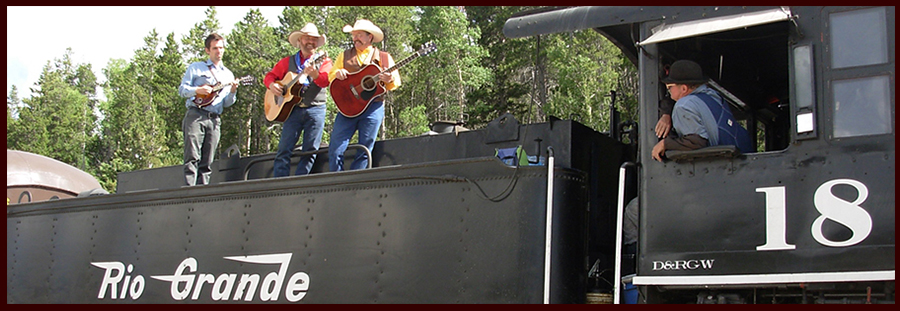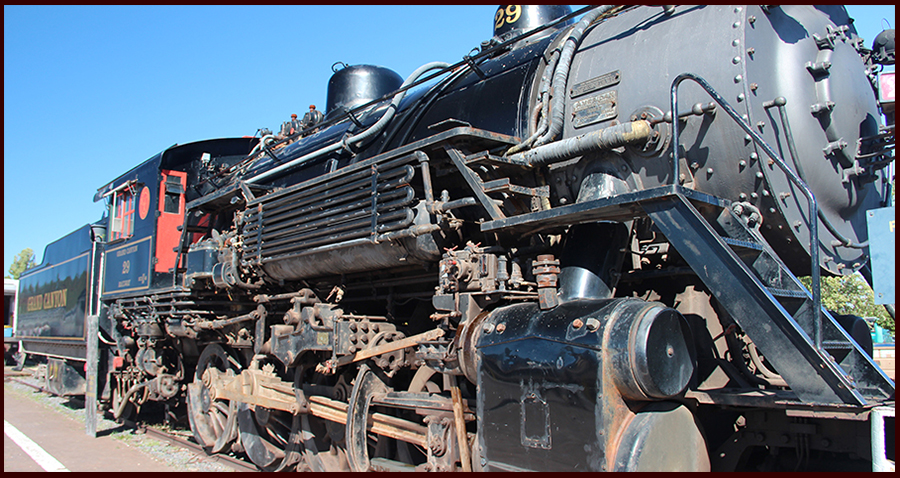Always a Train In My Dreams Words & Music by Steve Gillette & Charles John Quarto
Train songs. So many great ones. We've all grown up with them, and we've sung a bunch of them. One of my favorites is "Fast Freight" written by Terry Gilkyson and recorded by the Kingston Trio on one of their early albums. "Clickety-clack, clickety-clack, the wheels are singing with the railroad track, if you go you can't come back, if you go you can't come back ..." Remember "Waiting for a Train," "The Orange Blossom Special," and how about "The Wabash Cannonball?"
Dr. Archie Green of the American Folklore Society has written: "In the most direct sense, a spikedriver's chant or a fireman's elegy to his dead engineer was a verbal or musical form which helped members of a distinct occupational group define their social and economic roles. America has carried on a fifteen-decade love affair with iron horses and long steel rails. Obviously, train folklore was not the limited creation of railroad workers, for it was also formed and extended by individuals within other callings. Indeed, no other vocational lore, including that of cowboys and sailors, is as etched into the American character as rail lore."
The mystique of the Westward expansion, the romance of the rails, the sound and smell of the steam engine. For the Native American, the encroaching 'iron horse' meant the end of a way of life, and the end of many a life that depended on the buffalo and the open range. The titans who made their fortunes in that expansion and consolidation of rail commerce (Gould, Vanderbilt, Harriman, Stanford, Fisk, Morgan) were all colorful characters with legacies of world-beating consequence. That they inspired awe and occasional ridicule in addition to envy is chronicled in countless songs. "Jay Gould's daughter said before she died, 'there's two more drinks I'd like to try.' Jay Gould said, 'Daughter tell me what could they be,' 'A glass of water and a cup of tea!"
Railroad workers suffered many injuries. Before the automatic coupling mechanisms came into use, a man had to stand between the cars as they would close the gap, and insert a pin into the coupling. In hiring a worker, the boss would ask him to hold up his hands to see if he was missing any fingers. That meant he had experience, and he got the job. Dr. Green writes that: "One response to hazardous and onerous work was trade unionism. Railroaders were organizing unions early, and engaged in serious strikes during 1877 and 1894. Strikers were frequently dealt with violently and were also blacklisted. Such job discrimination led boomers to develop the custom of using their brotherhood (union) paid-up cards as 'pie-cards.' Hence, membership cards became meal tickets to gain food, rides, or shelter from other union brothers."
There's a haunting imperative, a siren song that lingers from the days before the first world war, calling a man to hop a freight and take up a new life, or reclaim an old one on the ever moving mechanical roadway. Restless souls took advantage of the transportation offered as the railroads rumbled along across the map. 'Riding the blinds' was to jump aboard the train into the space at the head of a freight car or grain hopper, a place not readily visible to the 'bulls' the railroad security men who could be brutal in their imposition of railroad justice. For a man to 'ride the rods' actually required him to suspend himself under the train car on two metal cables that hung perilously close to the cross ties as they flew by. Often this practice resulted in injury or death.
There's an excellent glossary of hobo expressions here.
And there's that amazing modern train whistle, a combination of tones contrived to be heard by the most distracted driver nearing a crossing at the same time as the speeding steel behemoth. Steam whistles were almost always actuated with a pull cord or a lever that permitted proportional action, so that some form of 'expression' could be played into the sound. Many engineers would have their own style of blowing the whistle, and it was often clear who was operating the locomotive by their unique voice. Train whistles are still used to communicate with other railroad workers on the train or in the yard. Different combinations of long and short whistles have different meanings. Blasts on the whistle are used to pass instructions, as a safety signal, and to warn of impending movements of the train.
In my early childhood, my mother took me to visit my grandparents on a train. As she held onto my three year old hand, we walked by the locomotive and it let out a huge gasp of steam. Needless to say I was quite impressed, if terrified counts as an impression. In my song about the man who loves a train, I explored another aspect of the romance of train travel, the amazing effects of the vibration of the rails on the amorous exploits of young lovers. I thought it quite nicely walked the line between double entendre and outright suggestiveness. It can be heard on my CD "The Man." Listen below.
"The Man Who Loves a Train" by Steve Gillette
From Steve's CD "The Man"
Steve's CD, "The Man," is available for purchase here.
In recent years we've had opportunities to relive the fantasy of the old trains. One of our favorite adventures was provided by our friend, Ed Ellis, a train buff from his early youth, and the CEO of the Historic Rio Grande Railroad. Ed assembled cars from the original City of New Orleans which ran from Chicago to New Orleans for forty years. He has presented a series of concerts on a solar and wind-powered stage at 9,400 feet at the top of the La Veta Pass, near Alamosa in Southern Colorado. Ed has given us the chance to share the bill with Michael Martin Murphy, Pure Prairie League, Juice Newton, Suzy Bogguss, Chuck Pyle, Michael Smith and Anne Hills.

Michael Martin Murphy, his son Ryan and Fred Hargrove pose at La Veta Pass
Charles John Quarto and I wrote "Always a Train In My Dreams" based on a idea that Charles had. Admitting to a certain amount of boredom in his school classes, he writes about indulging in wanderlust. Trains have always seemed to offer that escape.
The song was one that Jim Rooney produced for me with a wonderful group of Nashville sidemen. It's on my CD, "The Ways of the World," and can be heard in this video. The first few images are from the Rio Grande Historic Railroad and the rest from our local train yard here in Vermont. Watch for the 'ghost train' at 2:15.
Audio from Steve's CD "The Ways of the World." Video by Steve.
My CD "The Ways of the World" is available for purchase here, on CD or as an MP3 album.
Here are the lyrics as we sing it:
The trains ran past our house in the summertime But it was the whistle that carried me away. That's a feeling that is clear within in this heart of mine And it gets a little stronger every day. All through High School, time and time again I'd stare out the window and wait for a sign. Seems like it was always written down On the railroad line. There was always a train in my dreams Always a railroad runnin' right under me. There was never a time that I wasn't free There was always a train in my dreams. The years peel back like an old onion skin Sweeter and sweeter as the rain rolls in. I know how it sounds and now I know what it means There was always a train in my dreams. There was always a train in my dreams Always a railroad runnin' right under me. There was never a time that I wasn't free There was always a train in my dreams.
© 1990, Foreshadow Songs, Inc. BMI

